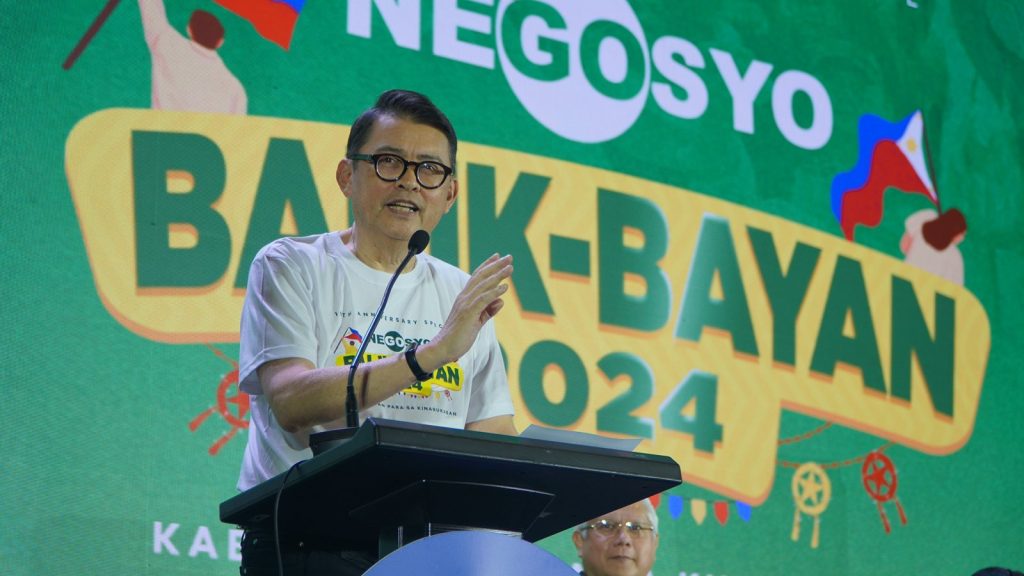
Let’s Bring Hope
December 2, 2024
OFWs and Families Receive More than PHP3 Million in Cash and Kind at Go Negosyo Event
December 9, 2024
The Time is Right for Entrepreneurship
If one needed any more proof that entrepreneurship is alive and well in the Philippines, one need only witness the enthusiasm that greeted two of our major events at Go Negosyo last week.
First was the Youthpreneur event we held at the country’s largest high school, the Rizal High School in Pasig City. Several schools for Mandaluyong and Pasig City joined us for the half-day event, and no less that DepEd Sec. Sonny Angara was there to cheer on the students to expand their knowledge of entrepreneurship.
And then just this weekend, thousands of people trooped to the SM Mall of Asia to attend our Balik-Bayan Summit, which we hold every year to help OFWs and their families explore options in entrepreneurship and put their hard-earned money to work as capital. Some were even lined up the evening before the summit. It’s heartwarming and indeed encouraging, especially for us at Go Negosyo who have been advocating for MSMEs for 19 years now.
In both, though, one will need a mentor. Employees can look up to their peers and supervisors for mentorship. Entrepreneurs can look up to other successful entrepreneurs, but unlike those working in companies where structured systems ensure that they upgrade their skills regularly, entrepreneurs have to look for people who can become their mentors.
Not everyone has access to a mentor for business. I was lucky that I came from a family of entrepreneurs and had plenty of people giving me advice once I decided to go into business. But think of all the neighborhood sari-sari stores that never grew into mini-marts or groceries. They probably never had access to more capital, they never expanded their stock beyond everyday essentials like soap and coffee and they probably had no mentor to point out where they could improve their business so they might grow.
That is why it was so important for us at Go Negosyo that the mentors go to where the MSMEs are and offer them mentorship. Everybody needs help, and even the most seasoned businessman can use a new perspective on how to grow the business.
Why is it important that our MSMEs grow from micro to small, small to medium and medium to large? Because they create the dynamism that refreshes the economy and keeps it active. MSMEs bring fresh perspectives and raise the level of competition as they enter the playing field. They keep businesses on their toes. Imagine if there was a continuous stream of new fast-food concepts or retail stores entering the market every couple of months; they would inspire more consumption and power the economy forward. This would be especially helpful for a consumer-driven economy like the Philippines.
The benefits go beyond having more spending. Imagine the jobs these MSMEs can create and the entire communities they uplift. The MSMEs that we, at Go Negosyo, recognize for their excellence invariably report that they have been able to employ people in their communities, often the marginalized or the idle.
MSMEs have been around for years, way before I founded Go Negosyo in 2005. But I think the time is now right for them to grow in leaps and bounds. What makes me so optimistic is that several factors are coming together for them. Private sector is throwing more support, government is setting a more conducive environment and now technology is breaking down barriers.
Also, Filipinos took to social media quite well. The more enterprising of them used it to sell on Facebook Live, on TikTok, on Instagram or to create content for YouTube to either get sponsorships or revenues from advertising. Whether they use content creation to promote their products or promote themselves as the products, they are entrepreneurs.
Given how well they’ve mastered the use of social media to their advantage, it makes me optimistic about how fast Filipino MSMEs can grow in the next few years. I’ve met many gregarious and enthusiastic small entrepreneurs during our public entrepreneurship events; they already know how to sell their products. Many years back, before social media, these same hardworking entrepreneurs would have found it difficult to get their products out there, and nearly impossible to go head-to-head with established brands. They would have been restricted by the budget needed to buy airtime for advertising and would not grow any farther or faster than the outlets they could afford to place their products in. Today, all they need is a smartphone and internet access, and an unlimited market is made accessible to them.
I am also encouraged by the supportive environment we have today. Big business and government are throwing their support behind MSMEs; big business knows that they need a wide base of small and medium enterprises to support their retail spaces, their factories or their farms, and government knows that it needs the MSMEs to achieve inclusive and sustainable growth. If only a few of those at the top get to realize the gains of economic development, it would be a short-lived growth.
Having been an adviser to three Philippine presidents now, I can say that government support is crucial in growing the MSME sector. Private sector cannot do it alone, and neither can government. We need the policy environment to make it easier for MSMEs to move up, and we need the expertise and resources of private sector to give the MSMEs the tools and resources.
We have to make sure every Filipino has either a trabaho or a negosyo. That’s the only way we can grow the Philippine economy.

2/F RFM Corporate Center, Pioneer cor. Sheridan Sts. Mandaluyong City, Metro Manila, Philippines

